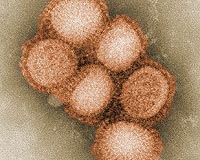| . |  |
. |
Oxford UK (SPX) Feb 22, 2010 A cheap and simple way of making vaccines stable - even at tropical temperatures - has been proven to work by scientists at Oxford University. The British technology, developed by specialist manufacturer Nova Bio-Pharma Technologies, removes the need for fridges, freezers and associated health infrastructure. It has the potential to revolutionise vaccination efforts - particularly in the developing world where infectious diseases kill millions of people every year. Oxford University carried out the proof-of-concept study on Nova's patented HydRIS (Hypodermic Rehydration Injection System) system, that creates thermally stable, instantly injectable formats. The results are due to be published in the journal Science Translational Medicine. The team showed it was possible to store two different virus-based vaccines on sugar-stabilised membranes for 4?? months at 45 degrees C without any degradation. The vaccines could be kept for a year and more at 37 degrees C with only tiny losses in the amount of viral vaccine re-obtained from the membrane. When required the membrane is then attached to a conventional syringe and flushed with liquid, with the re-dissolved product quickly and simply injected. Preparing vaccines that do not need refrigeration has been identified as one of the major unsolved problems in global health. Nova has now proved the potential to solve many of the problems that pharmaceutical and biotechnology companies have around stabilising the medicines of tomorrow, while offering significant practical advantages and reducing costs. Its patented technologies were also designed for ease and convenience of administration - and true availability at the 'point of care'. Dr Peter White, Nova's managing director, said the work by Oxford University demonstrated one successful application of Nova's patented HydRIS technology platform and that Nova has already successfully stabilised a wide range of viral and conventional vaccines. "This new technique of drug delivery is one of the most exciting developments in the British pharmaceutical and biotechnology industries, especially as it can be used for highly unstable products, for instance vaccines for malaria," he said. "The benefits it offers to our customers - with many now looking for more efficient, cost-effective ways of delivering drugs - and the impact it can have abroad, cannot be overstated." Lead author Dr Matt Cottingham of the Jenner Institute at the University of Oxford said: "Currently vaccines need to be stored in a fridge or freezer. That means you need a clinic with a nurse, a fridge and an electricity supply, and refrigeration lorries for distribution. "If you could ship vaccines at normal temperatures, you would greatly reduce cost and hugely improve access to vaccines. You could even picture someone with a backpack taking vaccine doses on a bike into remote villages." The research was funded by the Grand Challenges in Global Health partnership with other funds from the Wellcome Trust At its state-of-the-art facilities in Leicester, Nova has developed world-class expertise in aseptic processing of complex pharmaceuticals using sterile isolation technology. Nova can handle low value/high volume production (such as mass vaccination programmes); and high value/low volume products like bio-defence/therapeutic vaccines, which require rapid deployment in a user friendly format (such as for the emergency services/armed forces). The core principle of the HydRIS technology - the formation of sugar-glass stabiliser matrix on a fibrous membrane/surface with thermal stability - could be used as part of a diagnostic kit or device to enable usage/storage outside the cold chain, for example in medical or forensic use. HydRIS technology could be modified for a range of other applications like oral or topical delivery of stabilised vaccines/therapeutics for both human and animal use.
Share This Article With Planet Earth
Related Links Nova Bio-Pharma Technologies Epidemics on Earth - Bird Flu, HIV/AIDS, Ebola
 Global swine flu death toll creeps towards 16,000: WHO
Global swine flu death toll creeps towards 16,000: WHOGeneva (AFP) Feb 19, 2010 The global death toll from swine flu approached the 16,000 mark as the pandemic waned in much of Europe and Asia, the World Health Organisation said Friday. "As of 14 February 2010, worldwide more than 212 countries and overseas territories or communities have reported laboratory confirmed cases of pandemic influenza H1N1 2009, including at least 15,921 deaths," the WHO said in its latest up ... read more |
|
| The content herein, unless otherwise known to be public domain, are Copyright 1995-2010 - SpaceDaily. AFP and UPI Wire Stories are copyright Agence France-Presse and United Press International. ESA Portal Reports are copyright European Space Agency. All NASA sourced material is public domain. Additional copyrights may apply in whole or part to other bona fide parties. Advertising does not imply endorsement,agreement or approval of any opinions, statements or information provided by SpaceDaily on any Web page published or hosted by SpaceDaily. Privacy Statement |